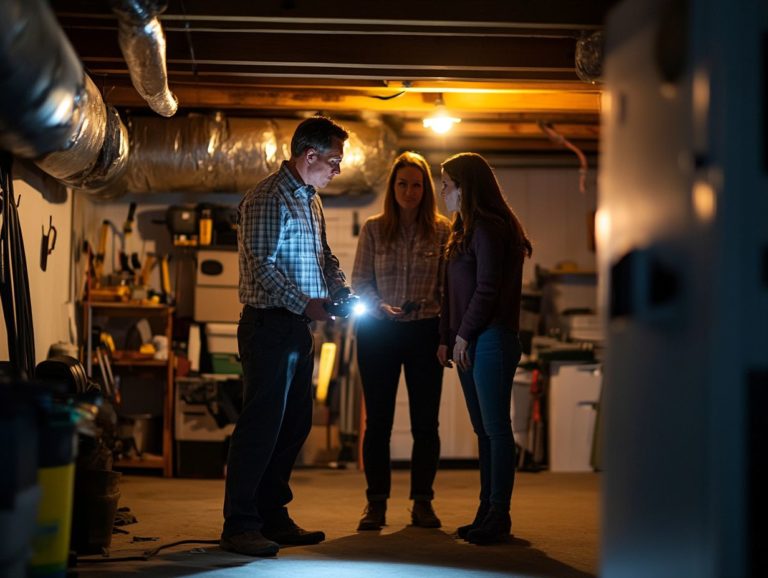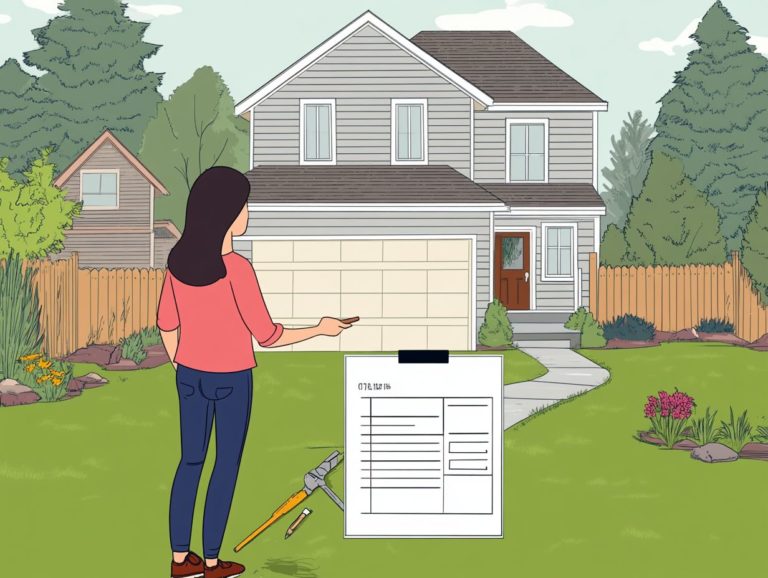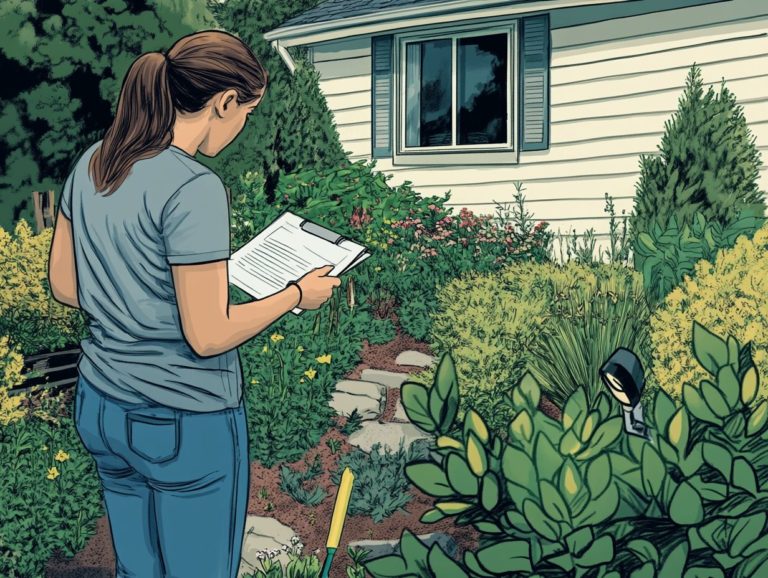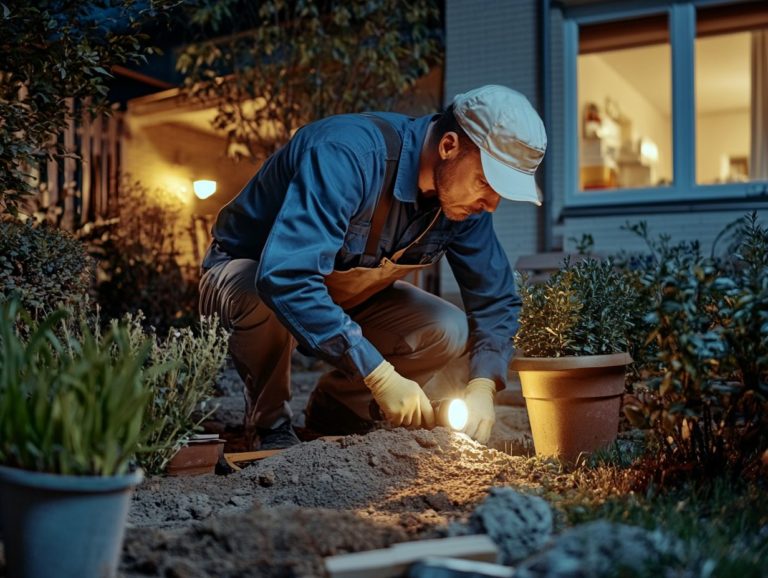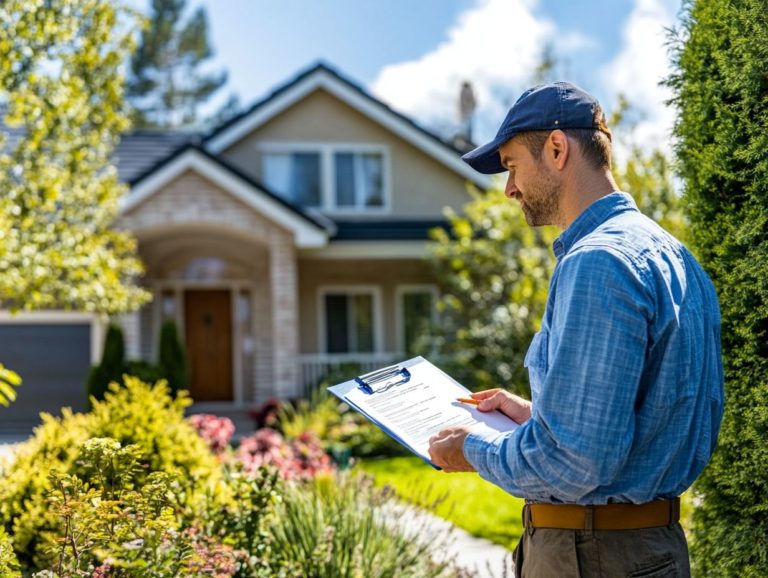How to Follow Up After a Home Inspection
Buying a home stands as one of the most significant investments you ll ever undertake. Therefore, a thorough home inspection is an essential step in your journey.
Once the inspection is complete, what comes next? Understanding what to do after your inspection is key. Addressing any issues, big or small, can greatly affect your home-buying journey.
This article will expertly guide you through crucial steps. From negotiating with the seller to conducting a final walkthrough, you ll be fully prepared for your new home.
Contents
- Key Takeaways:
- Importance of Home Inspections
- What to Expect from a Home Inspection Report
- Addressing Major Issues
- Dealing with Minor Issues
- Negotiating with the Seller
- Re-Inspection and Final Walkthrough
- Frequently Asked Questions
- How soon should I follow up after a home inspection?
- What is the best way to follow up after a home inspection?
- Who should I contact to follow up after a home inspection?
- What should I include in my follow-up communication after a home inspection?
- How should I handle any necessary repairs after a home inspection?
- What if the seller does not agree to make necessary repairs after a home inspection?
Key Takeaways:
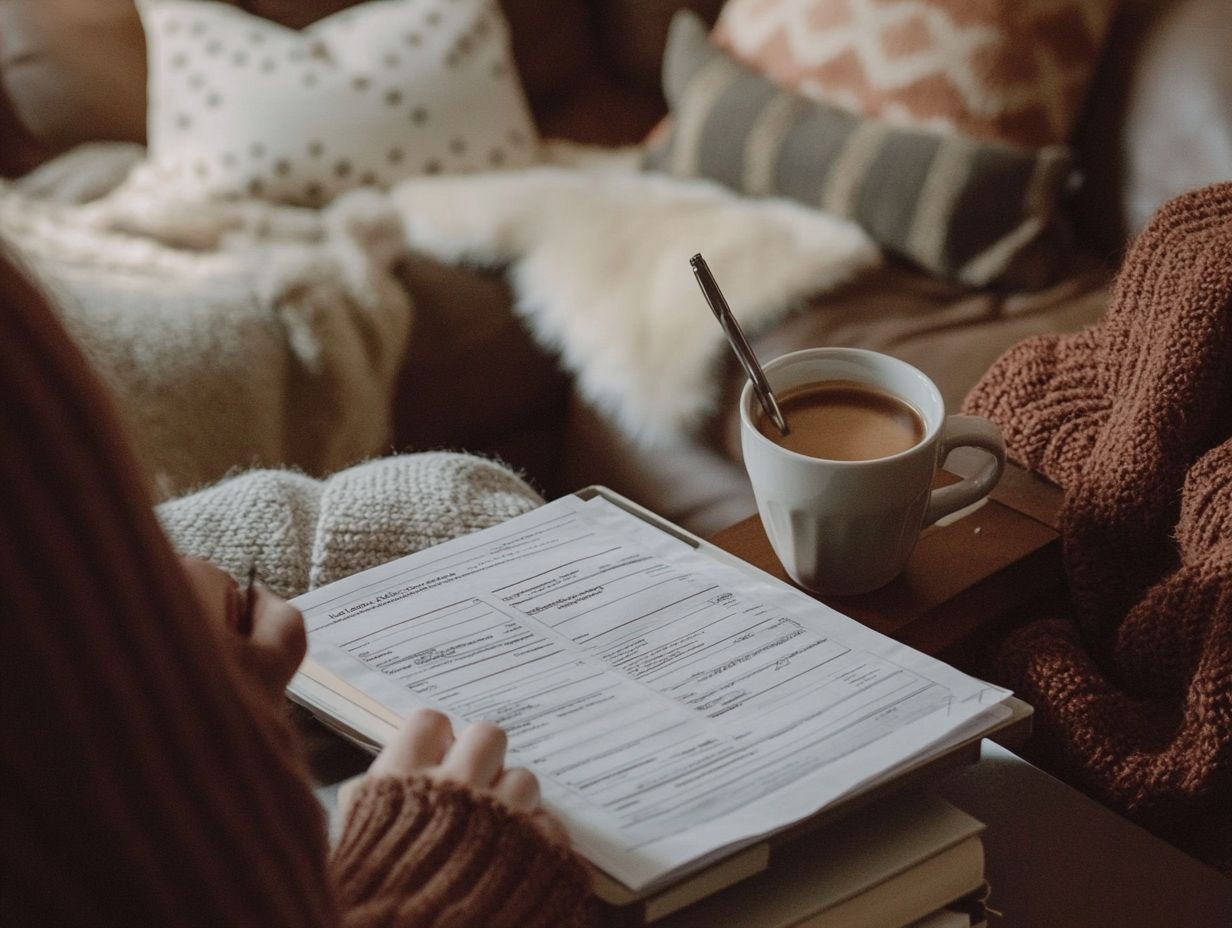
Importance of Home Inspections
Home inspections are a pivotal element in the real estate journey. They wield considerable influence over both buyers and sellers.
When you look closely at a property, you gain invaluable insights into its condition. This enables you to make informed decisions, safeguarding your investment and ensuring peace of mind in your new home.
For sellers, conducting a thorough inspection fosters transparency. It can enhance the property s marketability and value by addressing significant issues with major systems before listing. Recognizing the significance of home inspections paves the way for smoother transactions and greater satisfaction for everyone involved.
Why Follow Up After a Home Inspection?
Following up after a home inspection is essential for tackling findings in the inspection report, especially for handling repair requests such as HVAC problems or plumbing issues. Knowing how to follow up after a home inspection can streamline this process.
This proactive approach clarifies expectations regarding necessary repairs and enables effective negotiation with the seller. By presenting clear evidence of the home s condition, you can guide the negotiation process toward reasonable concessions or set timelines for repairs.
Talking about a home warranty can bring you peace of mind. It protects you against unexpected repairs down the line. Following up boosts your power as a buyer and builds trust with the seller. Don t miss this chance to secure your future home!
What to Expect from a Home Inspection Report
A home inspection report is an invaluable document that offers an in-depth analysis of the property s various aspects.
It outlines safety concerns, reveals structural damage, and identifies issues with major systems such as electrical problems and foundation concerns.
This comprehensive overview is essential for both home buyers and sellers. It equips them with the knowledge needed to make informed decisions.
Understanding the Results
Understanding the results of a home inspection report is crucial, whether you’re buying or selling. This report reveals vital insights into major systems like plumbing and HVAC while highlighting any safety concerns that need your attention.
The findings can range from minor cosmetic blemishes to significant structural issues that demand immediate action. For instance, an aging roof or outdated electrical wiring poses safety risks and can influence the home’s overall valuation.
As a buyer, you should evaluate any repair or replacement recommendations carefully, as these will be pivotal during negotiations. If you’re selling, be ready to address these concerns to avoid jeopardizing the sale.
This might involve adjusting your asking price or committing to necessary repairs to facilitate a smooth transaction.
Addressing Major Issues

Dealing with major issues found in your inspection isn’t just smart it’s essential! Whether it’s structural problems or electrical faults, taking action now safeguards your future.
Addressing significant issues uncovered during the home inspection requires proactive engagement. To ensure the property is safe and aligns with buyers’ expectations, it’s important to know how to make the most of your home inspection, which also helps safeguard the seller’s investment.
Steps to Take for Problems
When you encounter issues during the home inspection process, such as repair requests, it’s crucial to handle negotiations carefully. To navigate these situations effectively, you may also consider what to do after a home inspection and leveraging a home warranty for added peace of mind.
Start by prioritizing repairs that are critical to your safety and investment. Dive into the inspection report and create a clear list of necessary repairs to present to the seller. Additionally, consider learning how to follow up after a negotiation to strengthen your position.
When making repair requests, aim for a balance of reasonableness and specificity. Back your claims with evidence from the inspection findings. Open and respectful communication sets the stage for successful negotiations where both parties are likely to entertain concessions.
A home warranty offers reassurance against unexpected repairs after your purchase. This helps ensure a smoother transition into homeownership.
Dealing with Minor Issues
Addressing minor issues revealed during a home inspection, like slight plumbing or electrical problems, can typically be straightforward.
However, careful attention is needed to ensure these minor fixes are managed properly without overshadowing more significant concerns within the property.
Tips for Handling Minor Repairs
Handling minor repairs efficiently after a home inspection can save you time and pave the way for a smoother transaction. This allows you to focus on bigger negotiation points while still addressing essential repairs, such as learning how to handle post-inspection negotiations.
To achieve this, communicate openly with the seller about your concerns. By clearly outlining the minor repairs that need attention, you can foster a more amicable agreement.
Suggesting the use of a home warranty can be a smart strategy, as this may cover some of those minor fixes without placing an undue burden on the seller. Make sure to write down all agreed repairs to keep everyone accountable.
Ultimately, cultivating a cooperative atmosphere can lead to a satisfying resolution for both parties.
Negotiating with the Seller
Negotiating with the seller after a home inspection is a crucial moment in your real estate journey. This is your chance to address repair requests and seek concessions based on the inspection report, including knowing how to handle home inspection repairs.
How to Negotiate Repairs or Credits

When negotiating repairs or credits after a home inspection, come prepared with a compelling case based on the inspection findings. This means you can negotiate repairs based on the inspection results.
Recognizing that negotiations can be delicate, approach the seller with clear communication and empathy. Start by prioritizing issues that present safety hazards or financial burdens.
Providing documentation from your inspection report can strengthen your position, underscoring the necessity for the requested repairs or credits. Keeping a calm tone during discussions fosters productive outcomes.
Remember, adopting a collaborative attitude instead of an adversarial one can greatly increase your chances of reaching a mutually satisfying agreement. Stay flexible and consider alternatives like price adjustments or closing credits if direct repairs aren’t feasible.
Re-Inspection and Final Walkthrough
The re-inspection and final walkthrough stages of the home buying process are essential. This is your chance to ensure that all agreed-upon repairs have been completed and to refer to helpful resources like navigating the home inspection process to confirm that the property meets your expectations before finalizing the sale.
Taking the time to thoroughly assess the home in these stages allows you to enter this significant investment with confidence and peace of mind.
Are you ready to negotiate and make the most of your investment?
As you move forward, stay proactive and engaged in your home buying journey!
What to Check During Re-Inspection and Final Walkthrough
During your re-inspection and final walkthrough, check the major systems carefully. It’s crucial to ensure that any safety concerns from the initial home inspection are addressed, so consider reviewing how to get the most out of your home inspection.
Inspect the electrical systems to confirm every outlet, switch, and fixture is functional and meets safety codes. Don t overlook the plumbing; check for leaks and ensure hot and cold water flow properly.
As a smart homebuyer, pay close attention to the HVAC systems. Make sure they work well and have been serviced if needed.
Also, look for signs of mold, pest infestations, or structural issues. These checks will help you make a confident decision about your potential purchase.
Frequently Asked Questions
How soon should I follow up after a home inspection?
Make sure to follow up within 1-2 days! This ensures timely repairs or negotiations.
What is the best way to follow up after a home inspection?
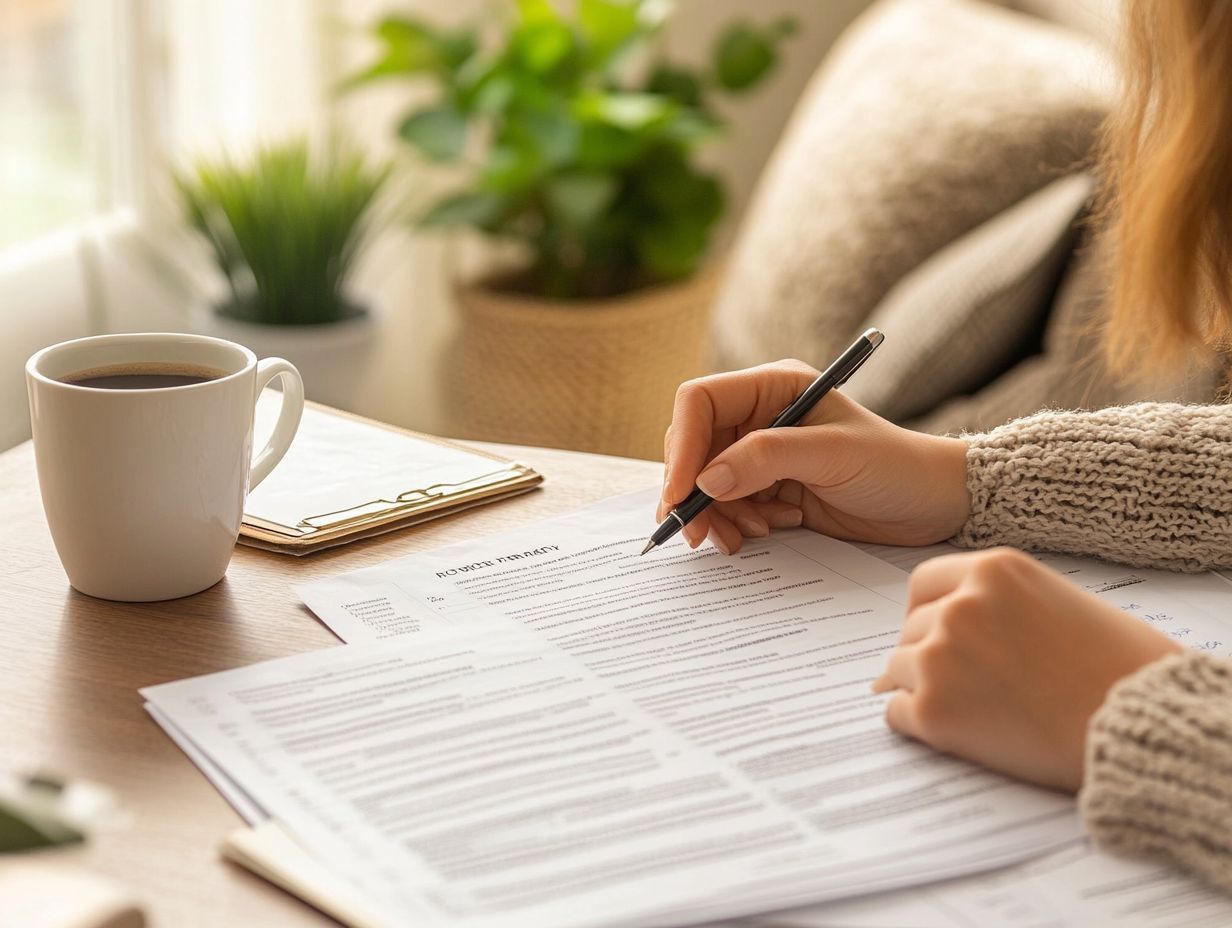
The best way is through written communication, like an email or letter. This ensures clear and documented communication.
Who should I contact to follow up after a home inspection?
Contact your real estate agent and the seller’s agent. They will help with necessary communication and negotiations.
What should I include in my follow-up communication after a home inspection?
Your communication should include any concerns identified during the inspection. Additionally, you should list necessary repairs and a proposed timeline for completion, which is crucial for how to handle home inspection contingencies.
How should I handle any necessary repairs after a home inspection?
You can negotiate with the seller to make the repairs or ask for a repair credit. Having your real estate agent assist you is important.
What if the seller does not agree to make necessary repairs after a home inspection?
If the seller refuses to make the repairs or offer a credit, you can choose to proceed as-is. Alternatively, negotiate a lower price or walk away from the deal. Your agent can advise you on the best action.

